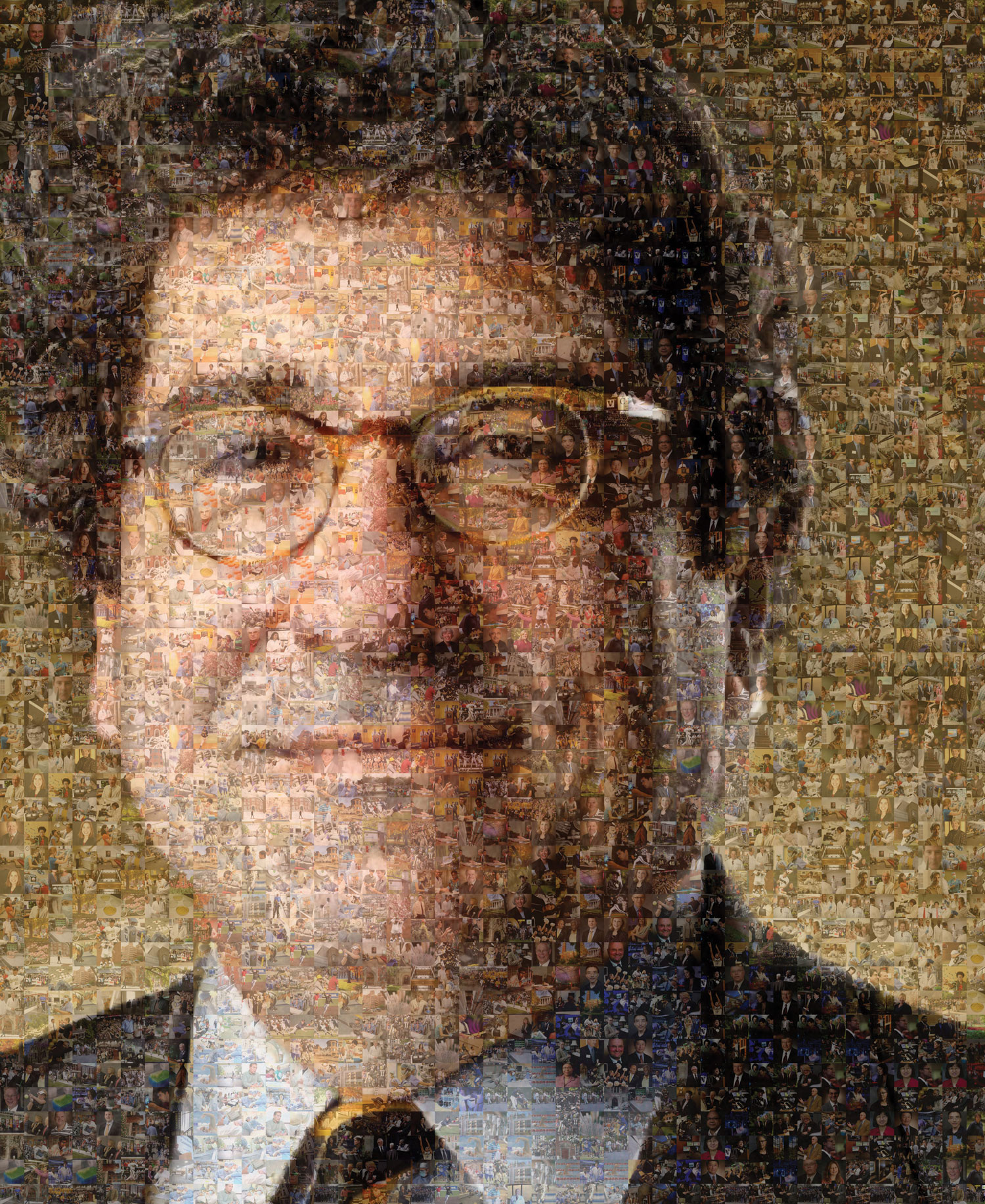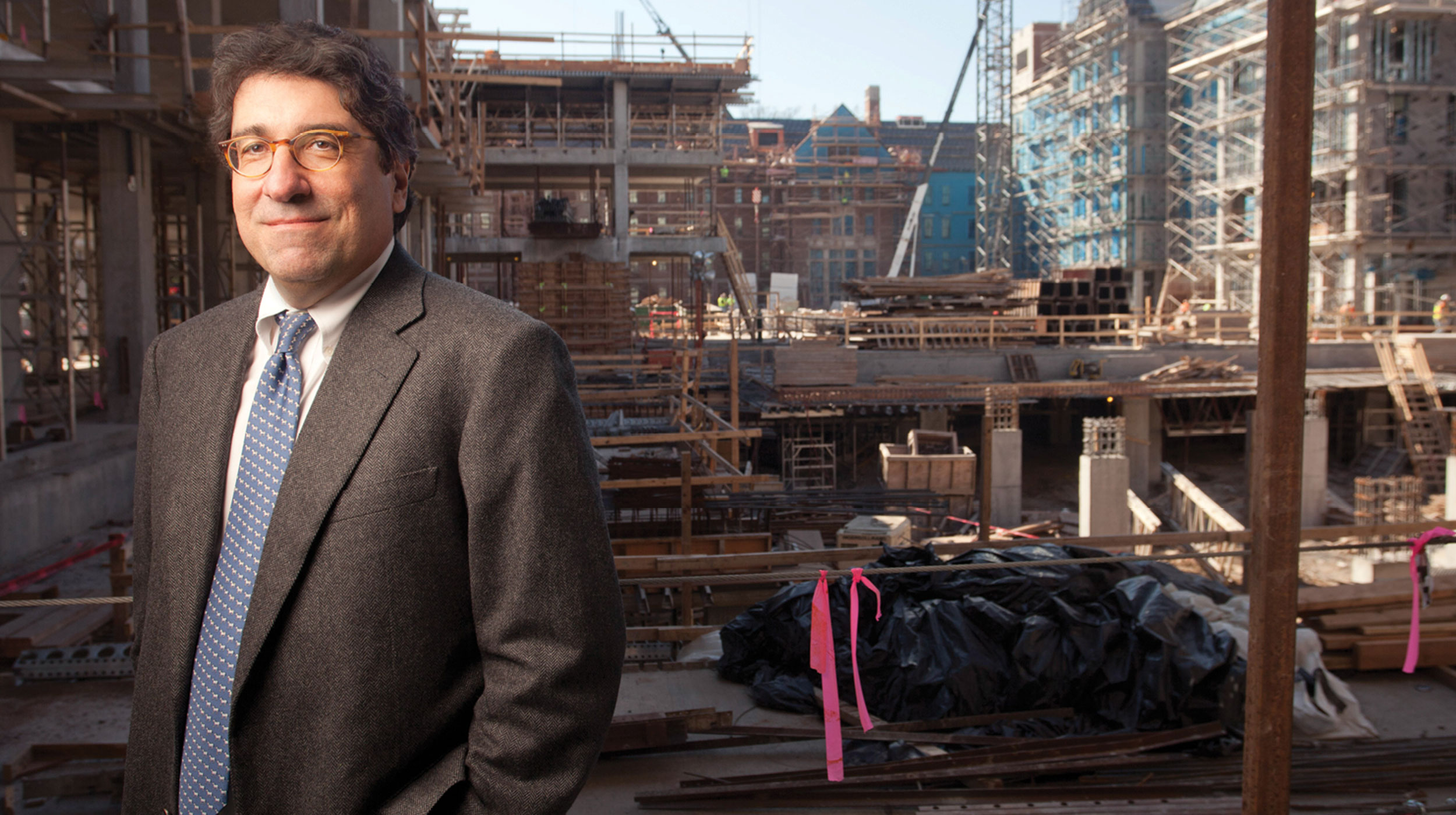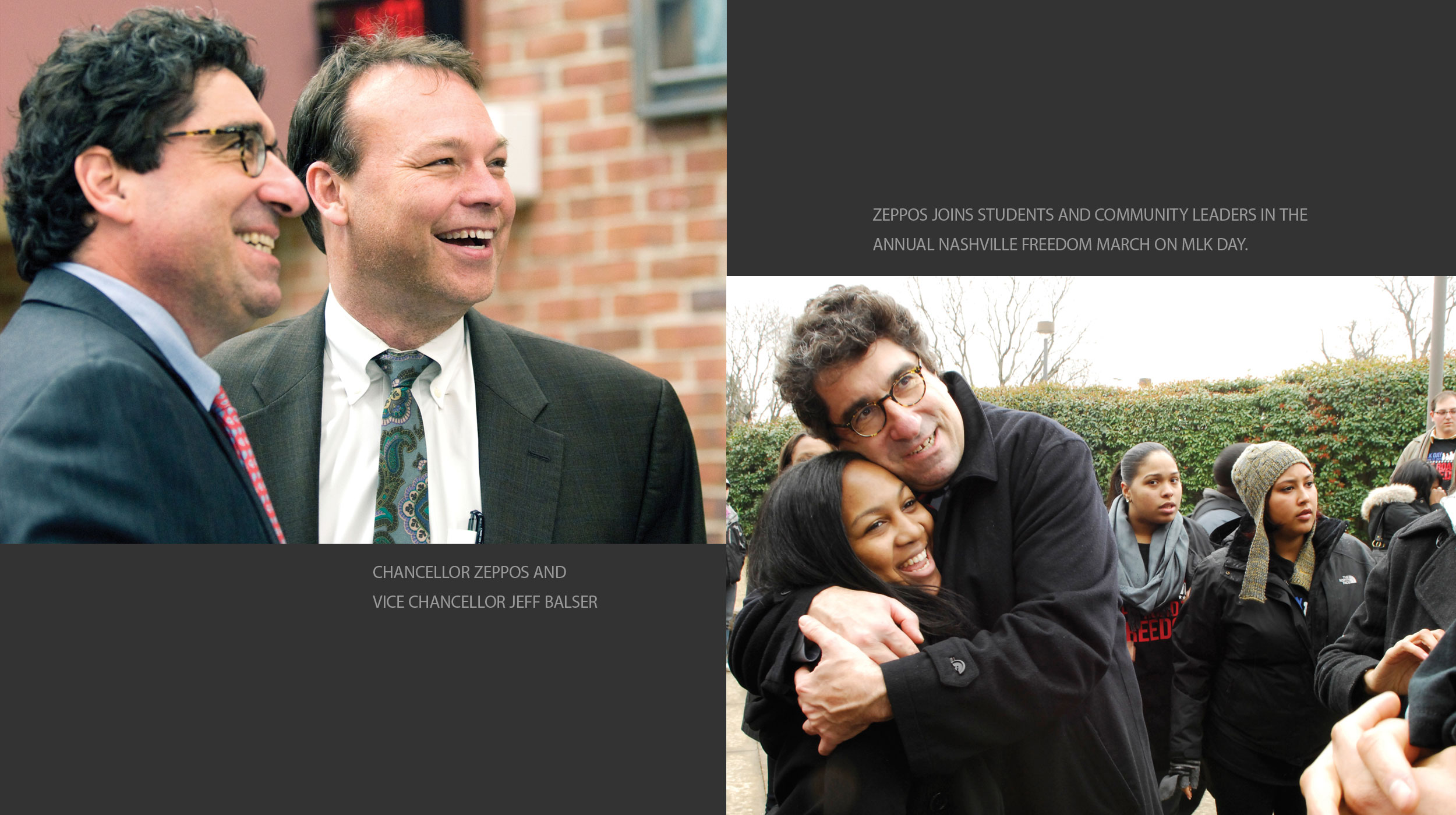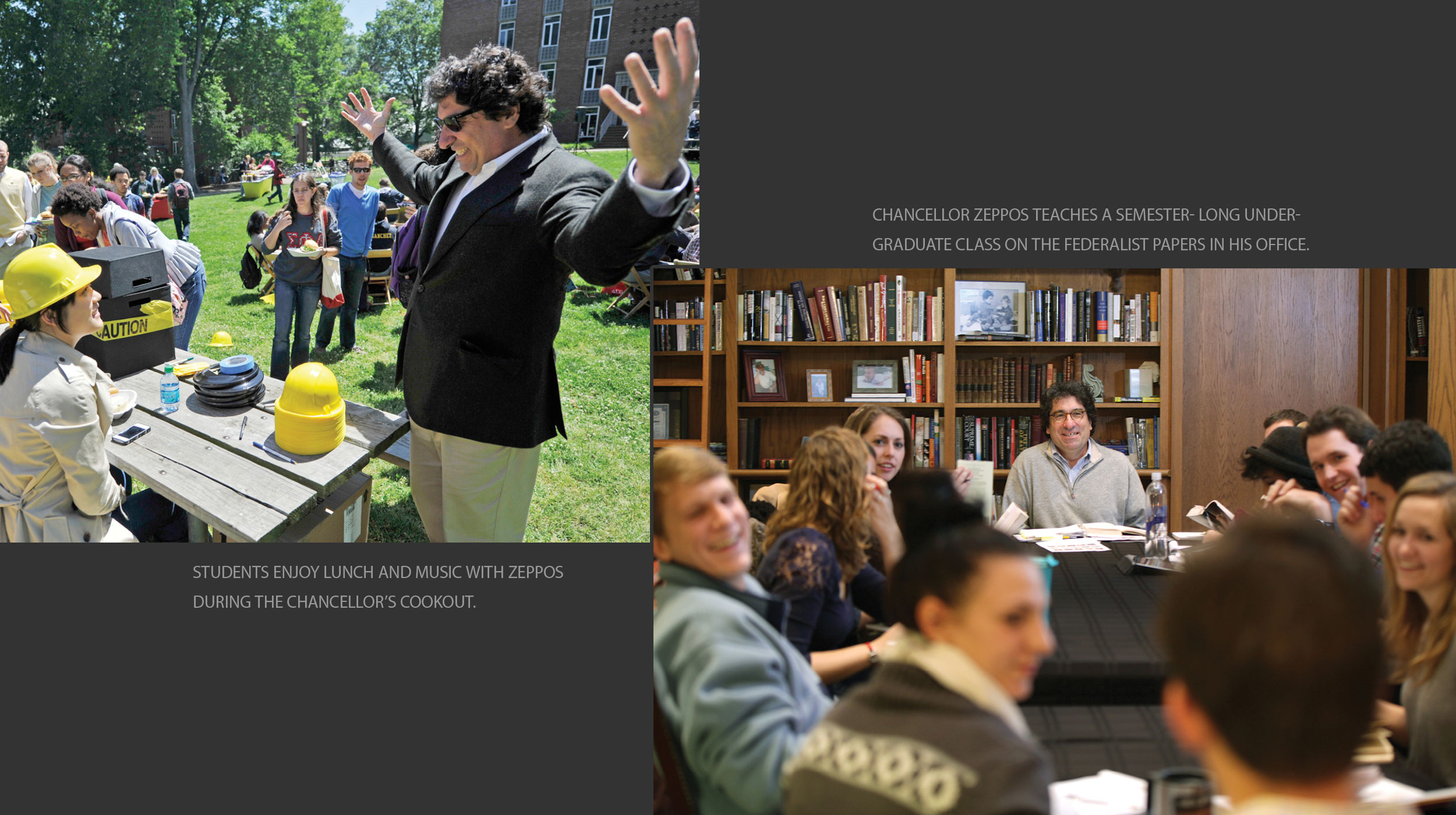BY JIM PATTERSON
PHOTOGRAPHY BY DANIEL DUBOIS, ANNE RAYNER, JOHN RUSSELL AND SUSAN URMY

You might expect to find a game ball from Vanderbilt’s 41–18 defeat of Tennessee last season in the spacious, wood-paneled office of Vanderbilt Chancellor Nicholas S. Zeppos.
Sure enough, it’s there. In fact, Zeppos so enjoyed that victory—the first against the Volunteers on Dudley Field in 30 years—that two balls from the game are tucked in among the many books, photographs and souvenirs that fill the floor-to-ceiling bookcases flanking either end of his office. But some of the other décor might surprise you.
An imposing portrait of Cornelius Vanderbilt II, the eldest grandson of the university’s founder, hangs opposite the office door. Displayed to the left of the door, you find a framed quotation from Abraham Lincoln, a portrait of Chief Justice John Marshall, and a copy of Hans Holbein’s famous portrait of Sir Thomas More. Over the chancellor’s computer is a poster of Frank Sinatra, Sammy Davis Jr. and Dean Martin—three members of the “Rat Pack,” all laughing big and enjoying themselves.
“It’s one of the early instances I can think of in show business when there was something multicultural going on,” Zeppos says, “but the truth is it reminds me of my parents. People said my dad looked like Dean Martin, and my parents loved the music of that era. And look at what a great time they are having together.”
[quoteit]An enthusiastic booster for Vanderbilt, Chancellor Nicholas Zeppos is navigating Vanderbilt through challenging economic times with optimism, although he admits, “You must have skin like a Komodo dragon to do the job sometimes.”[/quoteit]
It turns out there are personal reasons for each of the works hanging on these walls. Zeppos graduated magna cum laude in 1979 from the University of Wisconsin Law School, where he was editor-in-chief of the law review and selected outstanding graduate in his class. After law school he worked in Chicago, clerking for judges in the Seventh Federal Circuit, and then headed east to Washington, D.C., first to a law firm and then to a job in the U.S. Justice Department. After six years of arguing cases before federal judges all over the country, he decided he wanted to teach law and accepted a position as assistant professor at Vanderbilt University Law School in 1987.
Zeppos will tell you he admires Sir Thomas More’s principled and lawyerly refusal to swear a loyalty oath to a king with whom he could not agree. He shares the convictions of the lawyer Abraham Lincoln, who answered those who were “certain that they represent the divine will” that: “I must study the plain, physical facts of the case, ascertain what is possible, and learn what appears to be wise and right.” He is grateful to John Marshall, whose opinions served to make the judicial branch an independent and influential branch of government.
And even if Cornelius Vanderbilt II, who is remembered primarily for the enormous homes he built for himself, is not a personal hero, it’s clear the chancellor believes it is always important to acknowledge the family whose original investment is still producing endowment returns for the university that bears its name. And the Rat Pack is there, as he says, to remind him to enjoy life.
While his office walls remind you that Chancellor Zeppos first arrived at Vanderbilt as a lawyer, and still thinks of himself that way, conversation makes it clear how important he regards his role as an educator and how deeply informed he is concerning the challenges facing higher education in America.

Don’t Call Him a Cynic
Zeppos, a native of Milwaukee, was named Vanderbilt’s eighth chancellor March 1, 2008. Previously, he had been named provost and vice chancellor for academic affairs in 2002 and oversaw undergraduate, graduate and professional education programs in the schools of liberal arts and sciences, engineering, music, education, business, law and divinity, as well as the university’s research, development and alumni relations offices.
During an interview to mark his fifth year as chancellor—an occasion that ignores an entire year spent as interim chancellor—Zeppos labels himself an “optimist,” a “skeptic” and “a questioning guy.”
Just don’t call him a cynic. Zeppos is an ardent believer in the win-win scenario.
He went looking for it in 2008 when he declared just after the start of one of the worst American financial setbacks since the Great Depression that Vanderbilt’s enhanced financial aid policy going forward would guarantee that students would graduate without crippling loans to repay. He goes looking for it every time he tells potential donors why Vanderbilt is the best way to establish their legacy. And he’s done it with the future of Vanderbilt’s medical center, declaring it will continue its leadership in the personalized medicine movement while it negotiates the challenging future of the health care industry.
“I see the chancellor as Vanderbilt University Medical Center’s biggest fan and supporter,” says Jeff Balser, MD’90, PhD’90, vice chancellor for health affairs and dean of the School of Medicine. “I constantly hear from people in the community how proud he is of what we do, and how often he points to VUMC as ‘the model for where health care needs to go in this country.’”
Vanderbilt is one of a handful of American research universities that owns and maintains its own medical center. Responsibility for VUMC falls to the Office of the Chancellor.
Vanderbilt officially endorsed the Affordable Care Act (ACA), a decision Zeppos acknowledges was controversial, but believes was necessary and forward-thinking. He hopes the ACA is just the beginning of several imperative major rethinkings of health care to come. “If people say the ACA will solve every problem, they don’t know how public policy works and they don’t know health care.
“We were looking at the consequences of not making changes in health care and what would happen at Vanderbilt,” he says. “Every year we provide approximately $400 million in charity care, community benefits and other unrecovered costs. We are a Level 1 trauma center. Providing that much uncompensated care each year cannot be accomplished without a significant reimbursement from the government. These are existential threats to the economy and to Vanderbilt. We’ve got to start moving in a new direction.”

While health care issues easily could take up all his time, the chancellor’s job is by necessity more global. He wants to know what is happening all over campus, with students and faculty, in Nashville and Tennessee as well as in Washington, and in circles of alumni all over the world.
[quoteit]“They’re coming to Vanderbilt because of our culture of friendship, community, living and learning on campus, the liberal arts education we provide, and the reputation we hold as a research powerhouse,” he adds. “These are the things I’ve tried to focus on as a chancellor and a teacher.”[/quoteit]
One recent week, just a partial list of activities from his schedule included two days in Washington to meet with members of Congress, a day trip to Atlanta for a Southeastern Conference symposium, individual meetings with each vice chancellor, speaking to the Faculty Senate, budget meetings, strategic planning meetings, a management team meeting with all the vice chancellors, hosting a dinner for a prospective faculty member, meeting with a former student, hosting a dinner for current students, four media interviews, an accreditation meeting, a meeting with new faculty, a meeting with a university donor, and hosting a Development and Alumni Relations event.
On Monday of that same week, he taught his undergraduate class on the Federalist Papers.
A good argument could be made that the chancellor of a major research university could better use that weekly two and a half hours of teaching time elsewhere. But the chancellor, who leads a Vanderbilt Visions group of freshmen every fall and this history class every spring, shakes his head of unruly black hair vigorously at the notion.
“To sit with those kids and really see the lights go on,” Zeppos says, “is a very profound experience, and it gets to the heart of why we are all here.
“They’re coming to Vanderbilt because of our culture of friendship, community, living and learning on campus, the liberal arts education we provide, and the reputation we hold as a research powerhouse,” he adds. “These are the things I’ve tried to focus on as a chancellor and a teacher.”
[featurefullquote]”To sit with those kids and really see the lights go on is a very profound experience, and it gets to the heart of why we are all here.”[/featurefullquote]
Man on a Mission
Teaching and research are the two tent-pole missions for Vanderbilt that Zeppos emphasizes repeatedly. Ask the chancellor about his job, and chances are the sentence he offers in return will have the word “mission” in it.
“I think you’re always building a university brick by brick,” he says. “We have a mission. We educate. We serve. We cure.
“We’re never done.”
In pursuit of that mission, Chancellor Zeppos has earned a reputation during the past five years as a charming, sincere and enthusiastic booster for Vanderbilt. He spends time cheering on the Commodores with generous donors and alumni, faculty and students in his box at Vanderbilt Stadium. He hosts events on campus and in the Vanderbilt University Residence to acknowledge and honor all the people—from loyal department secretaries to board members—who support the university’s mission. He travels to meet with people who are considering many options where to spend their money, to share his pride in Vanderbilt’s outstanding faculty and students and its commitments to education, research and health care.
Giving to the university has remained remarkably strong throughout the past half-decade, as hard an economic stretch as any chancellor has seen since the 1930s. According to the Division of Development and Alumni Relations, Vanderbilt has received more than $100 million annually for the past five years. The number of alumni who give has increased each of those years, and the percentage of graduating seniors who give has doubled.
“It’s been very gratifying,” Zeppos says. “I always say you can’t live forever, but if you give to a great university, you probably will. Your legacy will live forever.”
Students have approached him, Zeppos confides, to let him know Vanderbilt has changed not only their lives, but also the trajectories of their families. He surmises that those lives have been changed, in some part, by gifts made in the 1870s when the university was founded.
When things are going well, a university can appear to some to be an island—stable, calm and separate from the rest of the world. But this perspective is mistaken, not only because a complex ecosystem is constantly in motion within the university itself, but also because the university is in constant traffic with the world around it. The university sees its mission in terms of serving the world beyond its gates through education, research and healing. But a university is sometimes required to re-explain itself, its values and purposes to others. In fact, Zeppos says, “You must have skin like a Komodo dragon to do the job sometimes.”
In a particularly unfortunate irony, Zeppos recently has heard Vanderbilt described by some as a community that discriminates, based on its nondiscrimination policy that requires all campus organizations to be open to all students and to allow any of its members the opportunity to run for leadership positions. Organization members elect their own leaders.

“When you receive an acceptance letter from Vanderbilt,” Zeppos says, “it means you’ve been accepted into our community, and that Vanderbilt organizations are open to you for membership. You are welcomed into the Vanderbilt family.”
Discussions on and off campus with people who disagree with this viewpoint are welcome, as they should be in a free and civil environment, the chancellor adds, but his job is to represent and defend the tradition of nondiscrimination that has been a guiding spirit of the university. “I am not the first chancellor of Vanderbilt to defend these principles,” Zeppos says, “and they are not at odds with the benefits most colleges and universities bring to their surrounding communities.”
[quoteit]“We are a purposefully diverse community and see the power this philosophy generates. In the field of health care, for example, universities are the engine of global and local health solutions in diabetes, cancer, sickle-cell anemia and obesity. American universities are on the brink of so much potential for good, in so many fields, that clearly an important part of my job is to be the head cheerleader.”[/quoteit]
Universities, Zeppos says, look for partnership with society and can offer nearly unlimited potential for solving today’s problems and helping make a better world.
“We are a purposefully diverse community and see the power this philosophy generates. In the field of health care, for example, universities are the engine of global and local health solutions in diabetes, cancer, sickle-cell anemia and obesity. American universities are on the brink of so much potential for good, in so many fields, that clearly an important part of my job is to be the head cheerleader.”
It’s a role he embraces genuinely. “I believe America’s great universities are more and more seen as the sources of American innovation and discovery, as economic triggers and the realization of the American dream.”
Thinking of Vanderbilt specifically, he begins to pick up steam. “I think that increasingly—and it’s very heartening to me—our local leadership, our state legislature, our governor and our citizens are beginning to see Vanderbilt as an engine of economic opportunity.”
[featurefullquote]”We have a mission. We educate.
We serve. We cure. We’re never done.”[/featurefullquote]
Innovation, Discovery and Invention
Vanderbilt, founded 140 years ago, “is young and just getting started,” Zeppos muses. “You are never the new kid in town again, but I do think people are waking up to the fact that a university is of great value not only for the football games it wins and famous speakers it brings to town, but also for the research and discovery it champions and the social and economic improvements that flow from it.”
On the anniversary of his fifth year as chancellor, Zeppos seems fully focused on the future. “We are a hub of innovation,” he asserts. “We are seeing a lot of innovation out of Vanderbilt—new companies, new medicines, new mechanical devices. And we are all ears and looking for partners to bring these discoveries and inventions to light. We can do even more.”
This kind of optimism seems characteristic of the chancellor, but it’s a long way from where he started in 2008. He had barely moved into this impressive office with its reminders of university fathers and legal giants on its walls when the housing crisis hit, causing a financial panic.
“Timing for chancellors is everything,” Zeppos says. “I wish I could have foreseen the financial crisis, but of course so does everyone else. It set a tone of desperation that was difficult to manage, and we had to work very hard to comprehend the plain, physical facts of the case and ascertain what was possible in an effort to make the right decisions.”
Zeppos and his team were systematic and deliberate in addressing the financial crisis. There were cutbacks, but nothing draconian, and an effort to communicate often with faculty, students, staff and alumni. Zeppos credits colleagues across campus who asked for freezes in their own salaries and department funding in order to prevent other employees from being fired. “It was a true community effort in 2008,” he insists, “and I am proud to say it is happening again at Vanderbilt in response to sequestration and our state’s rejection of federal funding for the expansion of Medicare, but this is not a long-term solution to the problems we face in Tennessee and America in caring for the uninsured.”
The chancellor took solace and advice, he says, from past chancellors during the Great Recession of 2008. Sitting in Kirkland Hall, he read financial reports by Chancellor James Kirkland written during the Great Depression and by Chancellor Heard, who had faced 20 percent interest rates during his tenure in the 1960s and 1970s.
“Obviously, the ongoing and current political standoff in Washington, and the resulting financial instability, have created significant challenges for the university,” Zeppos says. “But I am not the first chancellor [to deal with such issues], and I can look to my predecessors for guidance.”
Another reliable source of support and counsel, stresses the chancellor, has been the financial expertise of the Vanderbilt Board of Trust. They deserve special credit, he says, for agreeing to begin the university’s much-lauded enhanced financial aid policy in the face of the financial crisis. And he praises them for maintaining Opportunity Vanderbilt—which aims to help students who need financial aid to graduate debt-free—as a prime goal of the future.
[quoteit]“We have a faculty that is one of the most distinguished teaching and research faculties in the world,” he declares. “We’ve continued to provide the best health care in the world to everyone, and to open the doors to our hospitals and clinics to everyone in need.”[/quoteit]
“One thing I have learned from working with Nick Zeppos is that he is always looking for opportunities to advance the university, even during the most challenging of times,” says Richard McCarty, who succeeded Zeppos as provost and vice chancellor for academic affairs. “A more cautious leader would have held back on our financial aid plan during the 2008–2009 academic year, but we pushed forward under his leadership and the university is much stronger for it.
“Our residential college system is one of his next big challenges, and I am confident he will guide us to a much more dynamic and engaged living–learning campus environment while managing through the uncertain times that lie ahead.”
Despite hardships like the financial crisis and the continuing uncertainty stemming from political conflict in Washington, Chancellor Zeppos remains grateful to be where he is and enormously proud of Vanderbilt.
“We have a faculty that is one of the most distinguished teaching and research faculties in the world,” he declares. “We’ve continued to provide the best health care in the world to everyone, and to open the doors to our hospitals and clinics to everyone in need.”
He smiles broadly, clearly enjoying himself. “I learn something new every day,” he says. “It’s a joy to be surrounded by people with passion, intelligence, and the shared belief that the world can be better and that what they are doing every day is a meaningful contribution toward that end. I walk across this beautiful campus and am keenly aware of all the ways Vanderbilt has bent the curve of someone’s life for the better, including my own.”